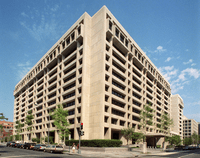The International Monetary Fund (IMF) has recently responded to criticisms of its policies toward the world's least developed countries (LDCs), by reforming its approach (.pdf) to "development" lending. The fund has long been a favorite target of civil society groups, who claim that the institution has no expertise in formulating development policy, that its stringent conditions often worsen already dire economic situations, and that its governance structure is highly undemocratic. The fund, they often seem to argue, should either be overhauled, or removed from LDC lending altogether.
So, is the new, gentler version of the fund an improvement for poor countries?
To answer that question, it's worth first taking a brief look at the conditions the world's most vulnerable economies have been facing the past few years. Even before the global financial crisis, LDCs were already facing their own private commodity crisis, brought on by the global increase in food and fuel prices. The subsequent collapse of the international financial system only made things worse: Foreign direct investment dried up or migrated to safe havens, tourists opted to stay close to home for vacations, and remittances slowed as lost jobs led many emigrants to return home.

